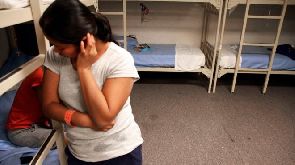The US Department of Justice is deploying 50 judges to immigration detention centres to clear a backlog of more than half a million cases. The judges will boost President Trump’s push to toughen enforcement of the law on illegal immigration.
In January he issued an executive order aiming to speed up deportations and hold migrants in detention centres until their cases can be heard.
But the court system is clogged up and the centres short of space. Mr Trump’s executive order directed the secretary for homeland security to expand capacity and end the policy known as “catch and release”, whereby immigrants held after crossing the border illegally are freed pending court hearings.
Now the Department of Justice has confirmed that a letter was sent requesting the deployment of extra judges.
They will work from detention centres to speed up the process of determining whether asylum is granted or deportation orders should be issued.
Currently a small number of such judges work from detention centres but most work from courts around the country.
The extra judges will be sent to locations near the Mexican border as well as other states across the US.
An estimated 11 million undocumented immigrants, many from Mexico, live in the US.
Following the executive order, new rules announced by Mr Trump’s administration last month included plans to send undocumented people to Mexico, even if they are not Mexicans, and expand the criteria for immediate deportations.
The government said the new guidelines would not usher in mass deportations, but were designed to empower agents to enforce laws already on the books.
Mr Trump has also ordered a wall be built on the Mexican border and insisted Mexico will pay for it, despite its repeated refusals.
The president made immigration and border control a key part of his election campaign, promising to protect Americans from “bad dudes”.
Travel ban challenge
Four US states joined Hawaii in a legal challenge against President Donald Trump’s revised travel ban, another key element of his immigration policy. On Monday, Mr Trump signed an executive order placing a 90-day ban on people from six mainly Muslim countries.
The ban begins on 16 March, with the White House saying it is “very confident” of winning in court.
The revised ban bars new visas for people from Somalia, Iran, Syria, Sudan, Libya and Yemen. It also temporarily blocks all refugees.
The previous order, which Mr Trump signed in January, was blocked in federal courts and sparked mass protests as well as confusion at airports.
But critics maintain the revised travel ban discriminates against Muslims. Which states have launched challenges and why?
Oregon – said the order hurts residents, employers, universities health care system and economy
Washington – it has “same illegal motivations as the original” and harms residents, although fewer than the first ban
New York – “a Muslim ban by another name”, said the attorney general Massachusetts – new ban “remains a discriminatory and unconstitutional attempt to make good on his campaign promise to implement a Muslim ban” Hawaii – argued it would harm its Muslim population, tourism and foreign students
Source: bbc.com








